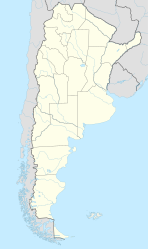Puerto San Julián
| Puerto San Julián | |
|---|---|
| Town | |

San Julián Bay
|
|
| Location of Puerto San Julián in Argentina | |
| Coordinates: 49°18′S 67°43′W / 49.300°S 67.717°WCoordinates: 49°18′S 67°43′W / 49.300°S 67.717°W | |
| Country |
|
| Province | Santa Cruz |
| Department | Magallanes |
| Elevation | 1 m (3 ft) |
| Population | |
| • Total | 6,143 |
| Time zone | ART (UTC-3) |
| CPA base | Z9310 |
| Climate | BSk |
Puerto San Julián is a natural harbour in Patagonia in the Santa Cruz Province of Argentina located at 49°18′S 67°43′W / 49.300°S 67.717°W. In the days of sailing ships it formed a stopping point, 180 km (112 mi) south of Puerto Deseado (Port Desire). Nowadays Puerto San Julián is also the name of a small town (population 6,143 as per the 2001 census [INDEC]) located on the harbour.
It was given its name by the Portuguese explorer Ferdinand Magellan who arrived there on 31 March 1520 and overwintered in the harbour. They met the native people who were described by Antonio Pigafetta as giants, and called them Patagonians. Although Pigafetta's account does not describe how this name came about, subsequent popular interpretations gave credence to a derivation meaning 'land of the big feet'. However, this etymology is questionable. The term is most likely derived from an actual character name, "Patagón", a savage creature confronted by Primaleón of Greece, the hero in the Spanish chivalry novel by Francisco Vázquez, published in 1512, much in fashion at the time, and a favourite reading of Magellan. Magellan's perception of the natives, dressed in skins, and eating raw meat, clearly recalled the uncivilized Patagón in Vázquez's book. Novelist and travel writer Bruce Chatwin suggests etymological roots of both Patagon and Patagonia in his book, In Patagonia, noting the similarity between "Patagon" and the Greek word παταγος, which means "a roaring" or "gnashing of teeth" (in his chronicle, Pigafetta describes the Patagonians as "roaring like bulls").
...
Wikipedia

